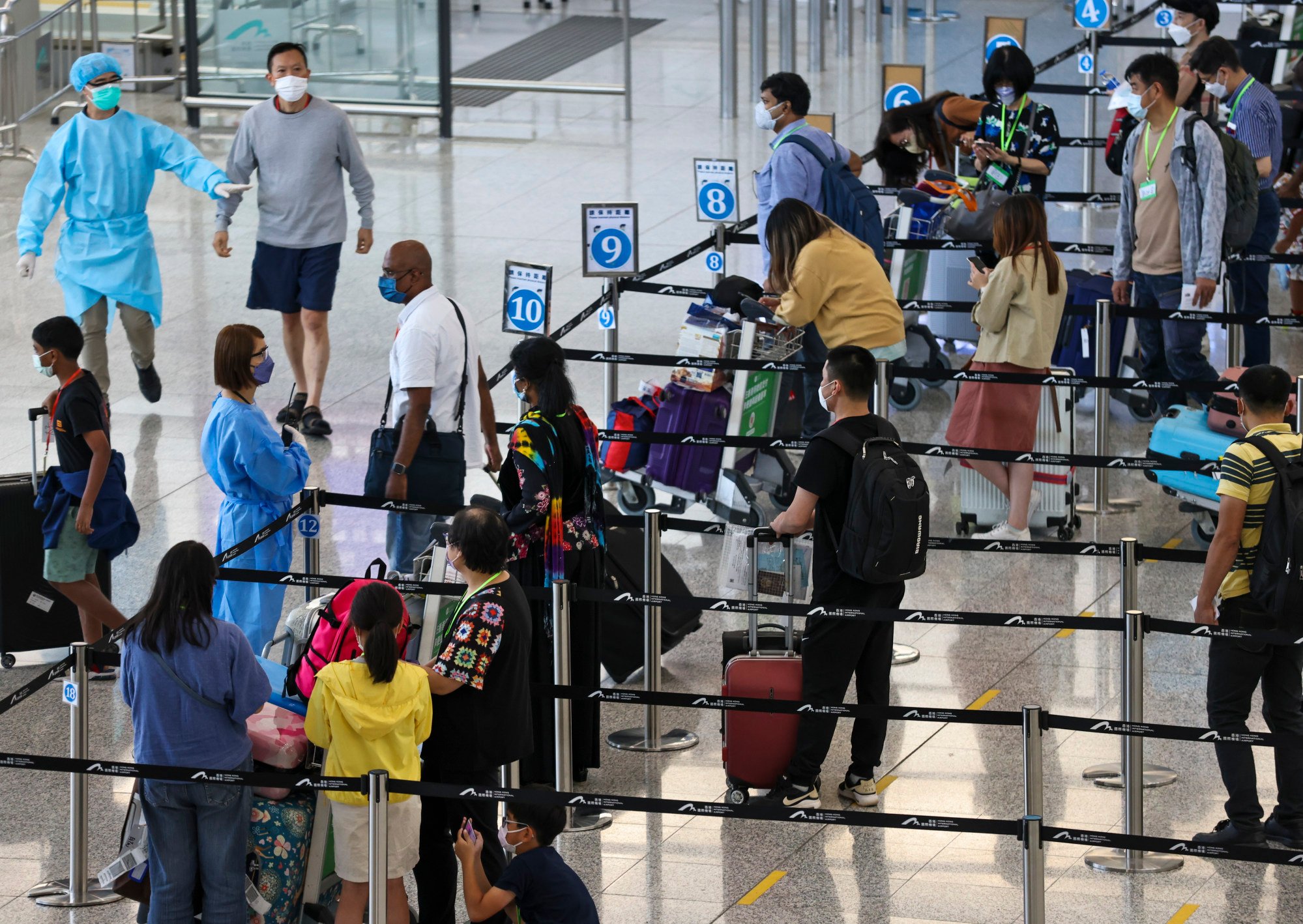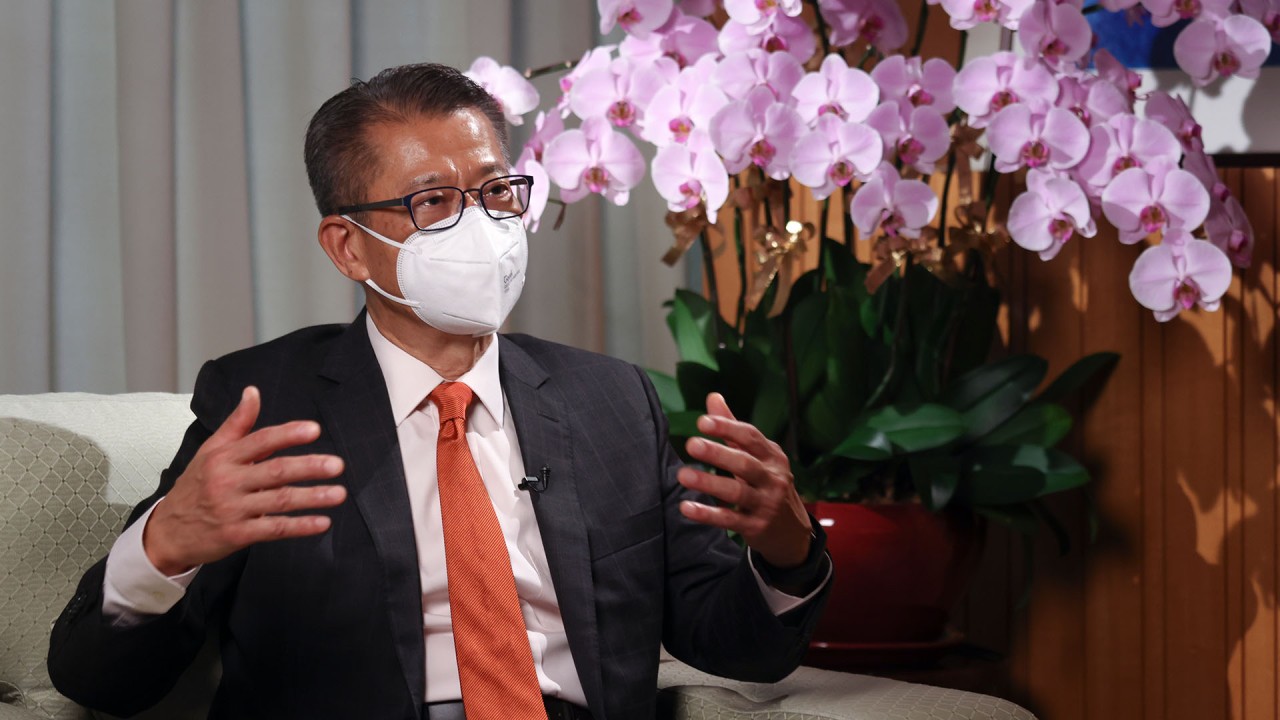
Exclusive | Hong Kong’s finance chief warns annual economic growth forecast could be cut, admits ‘most critical constraint’ has been border closure and pledges government is doing its all to ease rules
- Exports and investments remain sluggish despite rise in consumption, Financial Secretary Paul Chan says
- City’s economy in second quarter not as strong as expected and Covid-19 situation has taken more time to ease than previously predicted, he adds
Hinting that Hong Kong could be on the brink of a technical recession, Financial Secretary Paul Chan Mo-po said that while consumption had picked up, exports and investments remained sluggish and a review of the gross domestic product (GDP) forecast would be made in August.
Decouple Hong Kong’s currency from US dollar? ‘Absolutely not,’ Paul Chan says
Chan also acknowledged that the city’s strict quarantine rules had been the “most critical constraint that we are facing and we have to overcome” in trying to improve economic recovery.
This was why the new administration, adopting a “evidence-based and precise approach”, was looking into ways to relax isolation rules for incoming travellers to minimise inconvenience and yet protect the most vulnerable groups in society such as the elderly and the young, he said.
After suffering two years of contraction, of 1.7 per cent and 6.5 per cent, in 2019 and 2020 respectively, Hong Kong’s economy rebounded by 6.3 per cent last year.
In his budget speech in February, Chan had forecast the economy would grow by 2 to 3.5 per cent this year.

But after the economy recorded a 4 per cent contraction in the first quarter, the government downgraded its forecast of annual growth to 1 to 2 per cent.
In the interview on Monday, Chan said there was a chance the forecast would be further downgraded soon partly because the city’s economy in the second quarter was not as strong as expected, and the Covid-19 situation had taken more time to ease than he had predicted.
“We are still suffering from the fifth wave [of coronavirus infections], and in the second quarter, the Covid situation in mainland China also affects the supply chain [and] the economy,” he said, adding that high inflation had also seriously affected the US and European economies.

Chan said inflation in Hong Kong was still largely stable, at about 1.8 per cent in the first half of the year. He added that while food prices had increased, particularly in March when the Covid-19 situation disrupted cross-border transport, the bottleneck was now gone with various authorities monitoring carefully to avoid a recurrence.
The financial secretary said that in the second quarter, although consumption improved with the issuance of the government’s new set of digital vouchers, the improvements to export trade were less than satisfactory. Dampened by the Covid-19 situation, private investment had also slowed down considerably, he added.
Hong Kong’s external trade faltered last month, dropping by 6.4 per cent to hit HK$380.7 billion (US$48.5 billion), figures released on Monday showed, with the total value of exports in the first half of the year increasing by just 0.4 per cent over the same period last year.
“[Among] the three drivers for economic growth – export, consumption and investment – two … are being negatively affected,” Chan said, adding that while the second-quarter figures would be an improvement over the first quarter, they were “not as encouraging”.
“For the whole year … we will be announcing the result of the review in the middle of August. There is a chance for us to further revise the GDP forecast downwards.”
Two consecutive quarters of negative growth are seen typically as the start of a technical recession.
The financial chief noted that as the world’s economic outlook remained “not very strong”, both the World Bank and the International Monetary Fund had revised their global economic growth estimates more than once. The mainland’s second-quarter growth, at 0.4 per cent, was also “very moderate”, he added.
Hong Kong consumer price index up 1.5 per cent for past 6 months
Asked about solutions to turn things around, Chan said while the new round of consumption vouchers to be dispersed on August 7 could help boost private consumption, the “most important [factor] is still the Covid situation”.
“The ability to facilitate more travelling between Hong Kong and the mainland and Hong Kong and internationally. I think that is at the moment the most critical constraint that we are facing and we have to overcome,” he warned.
Chan, who joined the government as development chief in 2012 and was appointed financial secretary five years ago, said the new administration under John Lee Ka-chiu had adopted an “evidence-based and precise” anti-epidemic strategy.
Under this direction, the administration had been avoiding imposing across-the-board stringent measures, and instead sought to identify the risk areas and groups, such as young children and the elderly that officials “have to work hard on to contain the outbreak”, he said.

“We [also] try to enhance the quarantine requirements for inward travellers on a more evidence-based basis … and look at how we can minimise the inconvenience to the travellers,” he said.
Chan added that officials would, meanwhile, bear in mind that the highest standard of Covid-19 preventive measures needed to be maintained.
The Post reported on Monday that health officials were “actively considering” cutting Hong Kong’s hotel quarantine period for arrivals to three or four days, with authorities hoping at the same time to launch a mainland-style two-colour health code to better control the movement of infected patients and incoming travellers.
Covid and closed borders: why Hong Kong has avoided inflation
Chan said the colour code for the “Leave Home Safe” risk-exposure app would be one step forward to try to use new technology to regulate the movement of those being isolated in a more precise manner.
The financial chief also said that “everyone” in the government could feel the desire among residents for the city to reopen its borders.
“[Residents hope to] enable Hong Kong to better connect with the world. No matter whether it is travelling back to the mainland or travelling internationally. So this is people’s aspiration,” he said.
“From an economic standpoint, it is [also] very important for Hong Kong. So I will assure you in government we accord highest priority to this issue. The government has a very strong urge to do this as soon as possible.”
Simon Lee Siu-po, an honorary fellow of the Asia-Pacific Institute of Business at Chinese University, predicted that Hong Kong’s economy could contract by 1 to 2 per cent this year.

“The fifth wave was hitting Hong Kong pretty hard in terms of economic activities and person-to-person business engagement. We still do not see the end of the tunnel,” said Lee, adding the economic situation was directly affected by the extent of the government’s virus fighting policy.
“Resumption of quarantine-free travel with the mainland is still going nowhere. International travel and related business activities have yet to be discussed. They hurt Hong Kong as a logistics and professional services hub.”
Lee also worried about the downward revision of GDP growth affecting not only high value-added activities such as conferences and exhibitions, overseas mergers and acquisitions, but also the income growth for Hong Kong people.
“I’m pessimistic about the people’s income growth. Take wealth management as an example – you need to deal with customers face to face when it comes to money and wealth-related services. Potential customers might seek offshore wealth management service instead of local professionals,” Lee argued.
Hong Kong to ‘inevitably’ cut 2022 growth forecast, finance chief warns
Gary Ng Cheuk-yan, senior economist at Natixis Corporate and Investment Bank, said the firm had expected GDP to grow by 1 per cent in 2022 and its view had not changed since the fifth wave hit.
“The zero-Covid policy keeps bringing uncertainty to our economy. We saw inflation pressure and central banks around the world have raised interest rates. Those pressures put on Hong Kong have not decreased,” he said.
Ng said the government had underestimated the impact of the fifth wave. Yet he said he believed that with the government revising GDP growth further downwards it might pave the way for quarantine, or even some other anti-epidemic measures, to be further relaxed in the near future.
“Maybe it saw the pressure of economic growth and wanted to have a better balance between fighting viruses and maintaining economic stability,” he said.
Ng added that residents were still relatively conservative in spending money, and hoped the government would consider further measures to stimulate the economy.
Additional reporting by Oscar Liu






